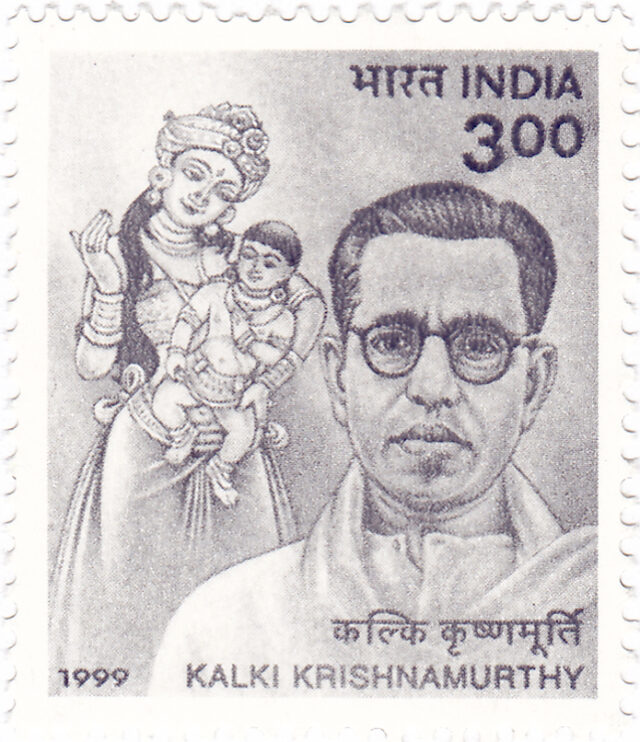
Krishnamurthy, popularly known by his pen name Kalki was a multi-faceted personality. Yes, he was a journalist, novelist, editor, lyricist, proponent of Tamil music and through all these roles he gave expression to express his deep-rooted desire that is for serving the national cause, propagation of Gandhian values, removal of untouchability, prohibition, atrocities against women and so on and so forth.
Kalki was born on September 9, 1899 in Puttamangalam village, near Mayavarm in Cauvery delta of Tamil Nadu. Therefore, he was aptly called as Ponniyin Pudhalvar (Son of Ponni, the other name for river Cauvery) by his admirers and adopted by his biographer Sunda later.
After schooling in his native village and nearby towns, joined National College in Tiruchy just to quit in a few months to take part in Non-Cooperation Movement forgetting the abject distressing condition his family was passing through. He was arrested thus for the first time in 1921. Later in 1931 and 1940 he was put behind the bars in 1931 and 1940 for taking part in Swatantrata Sangram. They further strengthened his patriotic fervour. They gave him a moral right to write in his magazines and novels exhorting young men and women to fight courageously against foreign power.
Kalki was inspired by Mahakavi Bharati’s songs, thoughts and words of Mahatma Gandhi and Chakravarthi Rajagopalachari (Rajaji). He translated Mahatma’s autobiography My Experiments with Truth and titled it as Sathya Sodhanai. He received the mentoring and guidance of Rajaji in Tiruchengode Ashram, run in the lines of Sabarmati Ashram. Kalki remained a steadfast follower of Gandhian principles and Rajaji’s political stands till the last.
He had an innate flair for journalism and it got shaped further when he came in association with Thiru Vi Ka, a great Tamil scholar and founder of the nationalist daily, Navashakti. He was associated with the popular magazine Ananda Vikatan and started his own magazine Kalki. He wrote under more than 10 pseudonyms. His editorials were sharp and witty. His famous comment about formations of committees to address issues was “if you want to finish a person, throw stone on his head and if you want to kill (delay) an issue throw it to a committee” which is relevant even after several decades.
His pride in our ancient culture reflected in most of his writings and very specifically in historic novels Parthiban Kanavu, Sivakamiyin Sabatham and Ponniyin Selvan. In Parthiban Kanavu, he portrays the generous heart of King Mahendra Pallava and his desire to avoid war. Sivakamiyin Sabatham has many admirable aspects. In it we see how Mahendra Pallava meandered through Jainisim and tortured Shiva Bhakta quickly realised and became a devotee of the very same Nayanmar (Siva bhakta) Tirunavukkarasar whom he had tortured earlier. Mahendra Pallava was also a connoisseur of arts and a poet, actor and play writer (Kalki likens him to King Harsha and Chandragupta of Gupta kingdom). However, his over indulgence in arts led him to ignore governance and debilitated the strength of his army. It was eventually capitalised by the Pulikesi II of Chalukya Kingdom to lay siege upon Kancheepuram, ransack the city and massacre of its citizens.
Later it fell upon, Mahendra’s son Narasimha Pallava to rebuild his army. Here, Kalki highlights one key tool used by Narasimha to motivate his dispirited commoners and soldiers. The simple and yet power technique was to build mandapams in many villages in his kingdom to conduct Mahabharata discourses (pravachans) and street plays talking about the valour of Bhima and Arjuna. Even today, in Northern districts you can see those Dharmaraja – Draupadi Amman temples, mandapams and families doing street plays, pravachans in praise the patience and persistence of Pandavas.
Ponniyin Selvan talks about the greatness of Chola Kingdom in general and Raja Cholan in particular. Raja Cholan, similar to Lord Rama, gives up his right to throne and makes his step-brother Madurantaka as the king. He spends his energy in quelling the rebel in Sri Lanka expanding the chola kingdom in East Asia. The foundation laid by him enabled his son to consolidate and build upon the empire. This novel has been a great hit even among the youth who generally do not have a liking for history.
Alai Osai was another great moving novel which captures the tragic story of partition. It also sheds light on the cruelties of Razakars and Communists in Hyderabad, the integration of Indian States. Thiyagaboomi advocates widow remarriage and Makutapati is short novel which condemns the caste discrimination and atrocities heaped upon underprivileged sections of the people.
Thus, the gifted Kalki deployed all his skills for the common good till tuberculosis took him away on December 5th, 1954.
Courtesy : VSK BHARATH














